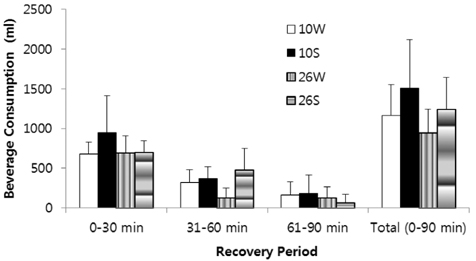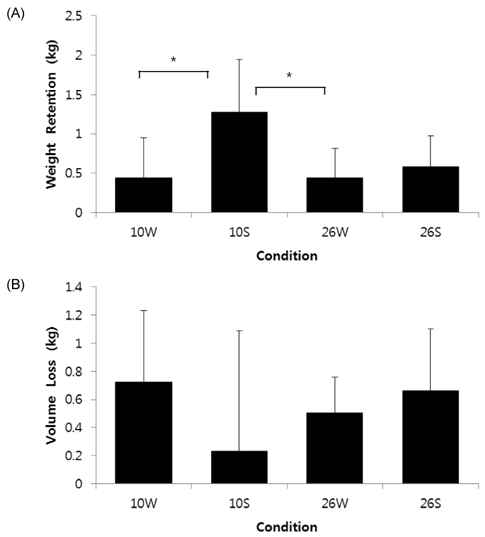Nutr Res Pract.
2012 Apr;6(2):126-131.
Effects of rehydration fluid temperature and composition on body weight retention upon voluntary drinking following exercise-induced dehydration
- Affiliations
-
- 1Exercise Physiology Laboratory, Kookmin University, Jeongneung-ro 77, Seongbuk-gu, Seoul 136-705, Korea. sung5523@hanmail.net
- 2Department of Sport for All, Jangan University, Gyeonggi 445-756, Korea.
Abstract
- The purpose of this study was to determine the effects of beverage temperature and composition on weight retention and fluid balance upon voluntary drinking following exercise induced-dehydration. Eight men who were not acclimated to heat participated in four randomly ordered testing sessions. In each session, the subjects ran on a treadmill in a chamber maintained at 37degrees C without being supplied fluids until 2% body weight reduction was reached. After termination of exercise, they recovered for 90 min under ambient air conditions and received one of the following four test beverages: 10degrees C water (10W), 10degrees C sports drink (10S), 26degrees C water (26W), and 26degrees C sports drink (26S). They consumed the beverages ad libitum. The volume of beverage consumed and body weight were measured at 30, 60, and 90 min post-recovery. Blood samples were taken before and immediately after exercise as well as at the end of recovery in order to measure plasma parameters and electrolyte concentrations. We found that mean body weight decreased by 1.8-2.0% following exercise. No differences in mean arterial pressure, plasma volume, plasma osmolality, and blood electrolytes were observed among the conditions. Total beverage volumes consumed were 1,164 +/- 388, 1,505 +/- 614, 948 +/- 297, and 1,239 +/- 401 ml for 10W, 10S, 26W, and 26S respectively (P > 0.05). Weight retention at the end of recovery from dehydration was highest in 10S (1.3 +/- 0.7 kg) compared to 10W (0.4 +/- 0.5 kg), 26W (0.4 +/- 0.4 kg), and (0.6 +/- 0.4 kg) (P < 0.005). Based on these results, carbohydrate/electrolyte-containing beverages at cool temperature were the most favorable for consumption and weight retention compared to plain water and moderate temperature beverages.
MeSH Terms
Figure
Reference
-
1. American College of Sports Medicine. Sawka MN, Burke LM, Eichner ER, Maughan RJ, Montain SJ, Stachenfeld NS. American College of Sports Medicine position stand. Exercise and fluid replacement. Med Sci Sports Exerc. 2007. 39:377–390.2. American Dietetic Association. Dietitians of Canada. American College of Sports Medicine. Rodriguez NR, Di Marco NM, Langley S. American College of Sports Medicine position stand. Nutrition and athletic performance. Med Sci Sports Exerc. 2009. 41:709–731.3. Shirreffs SM, Maughan RJ. Rehydration and recovery of fluid balance after exercise. Exerc Sport Sci Rev. 2000. 28:27–32.4. Montain SJ, Sawka MN, Wenger CB. Hyponatremia associated with exercise: risk factors and pathogenesis. Exerc Sport Sci Rev. 2001. 29:113–117.
Article5. Palmer MS, Spriet LL. Sweat rate, salt loss, and fluid intake during an intense on-ice practice in elite Canadian male junior hockey players. Appl Physiol Nutr Metab. 2008. 33:263–271.
Article6. Shirreffs SM, Maughan RJ. Volume repletion after exercise-induced volume depletion in humans: replacement of water and sodium losses. Am J Physiol. 1998. 274:F868–F875.7. Hubbard RW, Sandick BL, Matthew WT, Francesconi RP, Sampson JB, Durkot MJ, Maller O, Engell DB. Voluntary dehydration and alliesthesia for water. J Appl Physiol. 1984. 57:868–873.
Article8. Maughan RJ, Leiper JB, Shirreffs SM. Restoration of fluid balance after exercise-induced dehydration: effects of food and fluid intake. Eur J Appl Physiol Occup Physiol. 1996. 73:317–325.
Article9. Institute of Medicine. Water. Dietary Reference Intakes for Water, Potassium, Sodium, Chloride, and Sulfate. 2005. Washington, D.C.: National Academies Press;73–185.10. Maughan RJ, Shirreffs SM. Recovery from prolonged exercise: restoration of water and electrolyte balance. J Sports Sci. 1997. 15:297–303.
Article11. Shirreffs SM, Taylor AJ, Leiper JB, Maughan RJ. Post-exercise rehydration in man: effects of volume consumed and drink sodium content. Med Sci Sports Exerc. 1996. 28:1260–1271.
Article12. Adolph EF, Willis JH. Adolph EF, editor. Thirst. Physiology of Man in the Desert. 1947. New York: Interscience Publication;241–253.13. Boulze D, Montastruc P, Cabanac M. Water intake, pleasure and water temperature in humans. Physiol Behav. 1983. 30:97–102.
Article14. Sandick BL, Engell DB, Maller O. Perception of drinking water temperature and effects for humans after exercise. Physiol Behav. 1984. 32:851–855.
Article15. Szlyk PC, Sils IV, Francesconi RP, Hubbard RW, Armstrong LE. Effects of water temperature and flavoring on voluntary dehydration in men. Physiol Behav. 1989. 45:639–647.
Article16. Engell D, Hirsch E. Ramsay DJ, Booth DA, editors. Environmental and sensory modulation of fluid intake in humans. Thirst: Physiological and Psychological Aspects. 1999. Berlin: Springer-Verlag;382–402.
Article17. Engell DB, Maller O, Sawka MN, Francesconi RN, Drolet L, Young AJ. Thirst and fluid intake following graded hypohydration levels in humans. Physiol Behav. 1987. 40:229–236.
Article18. Wimer GS, Lamb DR, Sherman WM, Swanson SC. Temperature of ingested water and thermoregulation during moderate-intensity exercise. Can J Appl Physiol. 1997. 22:479–493.
Article19. Dill DB, Costill DL. Calculation of percentage changes in volumes of blood, plasma, and red cells in dehydration. J Appl Physiol. 1974. 37:247–248.
Article20. Szlyk PC, Sils IV, Francesconi RP, Hubbard RW. Patterns of human drinking: effects of exercise, water temperature, and food consumption. Aviat Space Environ Med. 1990. 61:43–48.21. Jung AP, Dale RB, Bishop PA. Ambient-temperature beverages are consumed at a rate similar to chilled water in heat-exposed workers. J Occup Environ Hyg. 2007. 4:54–57.
Article22. Shi X, Bartoli W, Horn M, Murray R. Gastric emptying of cold beverages in humans: effect of transportable carbohydrates. Int J Sport Nutr Exerc Metab. 2000. 10:394–403.
Article23. Sun WM, Houghton LA, Read NW, Grundy DG, Johnson AG. Effect of meal temperature on gastric emptying of liquids in man. Gut. 1988. 29:302–305.
Article24. Clapp AJ, Bishop PA, Smith JF, Mansfield ER. Effects of carbohydrate-electrolyte content of beverages on voluntary hydration in a simulated industrial environment. AIHAJ. 2000. 61:692–699.
Article25. Maughan RJ, Leiper JB. Post-exercise rehydration in man: effects of voluntary intake of four different beverages [abstract]. Med Sci Sports Exerc. 1993. 25:S2. Abstract no. 12.26. Passe DH, Horn M, Murray R. Impact of beverage acceptability on fluid intake during exercise. Appetite. 2000. 35:219–229.
Article27. Rivera-Brown AM, Gutiérrez R, Gutiérrez JC, Frontera WR, Bar-Or O. Drink composition, voluntary drinking, and fluid balance in exercising, trained, heat-acclimatized boys. J Appl Physiol. 1999. 86:78–84.
Article28. Beridot-Therond ME, Arts I, Fantino M, De La Gueronniere V. Short-term effects of the flavour of drinks on ingestive behaviours in man. Appetite. 1998. 31:67–81.
Article29. Rolls BJ, Wood RJ, Stevens RM. Palatability and body fluid homeostasis. Physiol Behav. 1978. 20:15–19.
Article30. Blundell JE, Hill AJ. Paradoxical effects of an intense sweetener (aspartame) on appetite. Lancet. 1986. 1:1092–1093.
Article31. Rogers PJ, Blundell JE. Separating the actions of sweetness and calories: effects of saccharin and carbohydrates on hunger and food intake in human subjects. Physiol Behav. 1989. 45:1093–1099.
Article32. Tordoff MG, Alleva AM. Effect of drinking soda sweetened with aspartame or high-fructose corn syrup on food intake and body weight. Am J Clin Nutr. 1990. 51:963–969.
Article33. Maughan RJ, Leiper JB. Sodium intake and post-exercise rehydration in man. Eur J Appl Physiol Occup Physiol. 1995. 71:311–319.
Article34. Maughan RJ, Leiper JB, Shirreffs SM. Factors influencing the restoration of fluid and electrolyte balance after exercise in the heat. Br J Sports Med. 1997. 31:175–182.
Article35. Costill DL, Sparks KE. Rapid fluid replacement following thermal dehydration. J Appl Physiol. 1973. 34:299–303.
Article36. Clapp AJ, Bishop PA, Walker JL. Fluid replacement preferences in heat-exposed workers. Am Ind Hyg Assoc J. 1999. 60:747–751.
Article37. Maughan RJ, Owen JH, Shirreffs SM, Leiper JB. Post-exercise rehydration in man: effects of electrolyte addition to ingested fluids. Eur J Appl Physiol Occup Physiol. 1994. 69:209–215.
Article38. Jones EJ, Bishop PA, Green JM, Richardson MT. Effects of metered versus bolus water consumption on urine production and rehydration. Int J Sport Nutr Exerc Metab. 2010. 20:139–144.
Article39. Nielsen B, Sjøgaard G, Ugelvig J, Knudsen B, Dohlmann B. Fluid balance in exercise dehydration and rehydration with different glucose-electrolyte drinks. Eur J Appl Physiol Occup Physiol. 1986. 55:318–325.
Article40. Institute of Medicine. Fluid Replacement and Heat Stress. 1994. Washington, D.C.: National Academies Press.41. Montain SJ, Cheuvront SN, Sawka MN. Exercise associated hyponatraemia: quantitative analysis to understand the aetiology. Br J Sports Med. 2006. 40:98–105.
Article42. González-Alonso J, Heaps CL, Coyle EF. Rehydration after exercise with common beverages and water. Int J Sports Med. 1992. 13:399–406.
Article43. Andersson B. Regulation of water intake. Physiol Rev. 1978. 58:582.
Article44. Fitzsimons JT. Angiotensin, thirst, and sodium appetite. Physiol Rev. 1998. 78:583–686.
Article
- Full Text Links
- Actions
-
Cited
- CITED
-
- Close
- Share
- Similar articles
-
- The Effects of Health Education and Program Induced Self-participation of Exercise on Body Composition and Self-efficacy in Obesity and Overweight Children
- Efficacy of Pre-procedural Rehydration against Thromboembolic Complications for Ruptured Aneurysm Embolization
- The Effect of Regular Exercise Program on Body Composition and Body Image in Adults Using One Fitness Center
- Effects of Dehydration on Vasopressin and Oxytocin Immunoreactive Neurons of the Hypothalamus in the Mongolian Gerbil
- Effects of Whole Body Vibration Exercise on Body Weight and Body Composition in Young Adults



